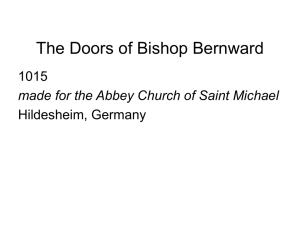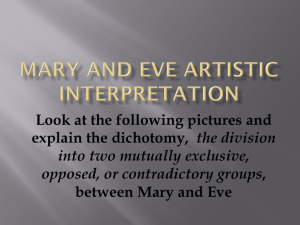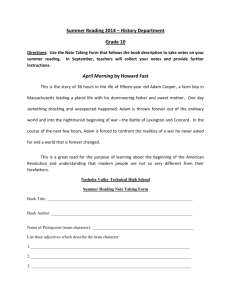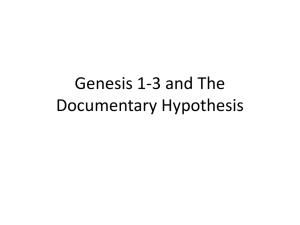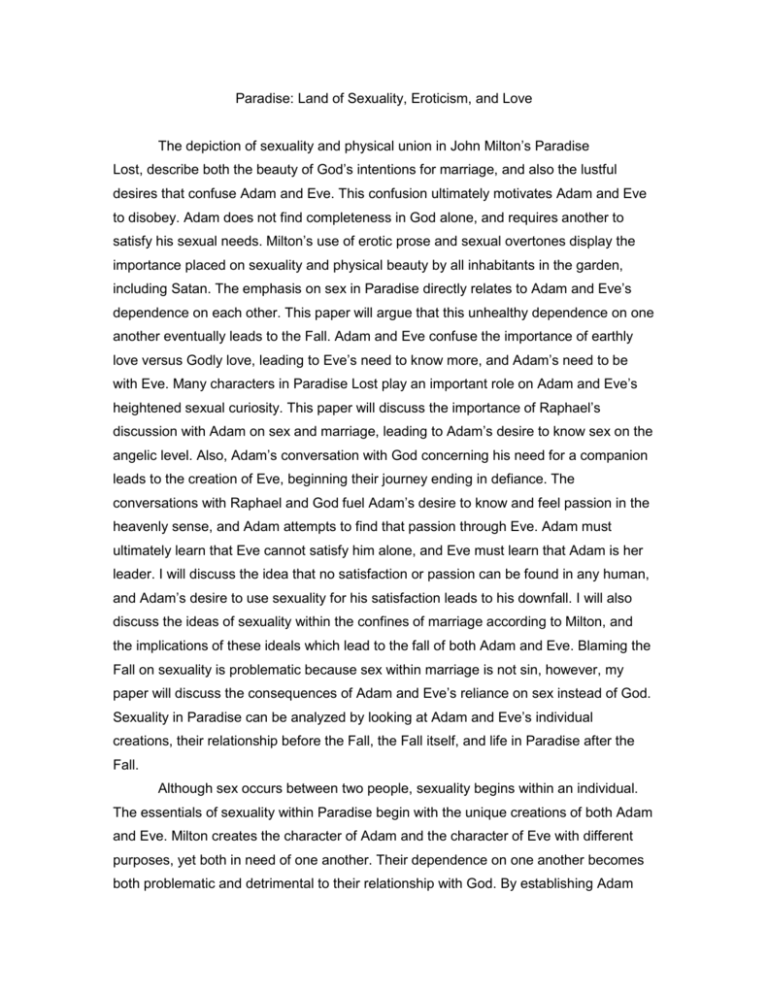
Paradise: Land of Sexuality, Eroticism, and Love
The depiction of sexuality and physical union in John Milton’s Paradise
Lost, describe both the beauty of God’s intentions for marriage, and also the lustful
desires that confuse Adam and Eve. This confusion ultimately motivates Adam and Eve
to disobey. Adam does not find completeness in God alone, and requires another to
satisfy his sexual needs. Milton’s use of erotic prose and sexual overtones display the
importance placed on sexuality and physical beauty by all inhabitants in the garden,
including Satan. The emphasis on sex in Paradise directly relates to Adam and Eve’s
dependence on each other. This paper will argue that this unhealthy dependence on one
another eventually leads to the Fall. Adam and Eve confuse the importance of earthly
love versus Godly love, leading to Eve’s need to know more, and Adam’s need to be
with Eve. Many characters in Paradise Lost play an important role on Adam and Eve’s
heightened sexual curiosity. This paper will discuss the importance of Raphael’s
discussion with Adam on sex and marriage, leading to Adam’s desire to know sex on the
angelic level. Also, Adam’s conversation with God concerning his need for a companion
leads to the creation of Eve, beginning their journey ending in defiance. The
conversations with Raphael and God fuel Adam’s desire to know and feel passion in the
heavenly sense, and Adam attempts to find that passion through Eve. Adam must
ultimately learn that Eve cannot satisfy him alone, and Eve must learn that Adam is her
leader. I will discuss the idea that no satisfaction or passion can be found in any human,
and Adam’s desire to use sexuality for his satisfaction leads to his downfall. I will also
discuss the ideas of sexuality within the confines of marriage according to Milton, and
the implications of these ideals which lead to the fall of both Adam and Eve. Blaming the
Fall on sexuality is problematic because sex within marriage is not sin, however, my
paper will discuss the consequences of Adam and Eve’s reliance on sex instead of God.
Sexuality in Paradise can be analyzed by looking at Adam and Eve’s individual
creations, their relationship before the Fall, the Fall itself, and life in Paradise after the
Fall.
Although sex occurs between two people, sexuality begins within an individual.
The essentials of sexuality within Paradise begin with the unique creations of both Adam
and Eve. Milton creates the character of Adam and the character of Eve with different
purposes, yet both in need of one another. Their dependence on one another becomes
both problematic and detrimental to their relationship with God. By establishing Adam
and Eve as incomplete creatures without one another, Milton raises some interesting
questions concerning the nature of satisfaction in God alone. From the moment he is
created Adam longs for a companion and desires more than what he has. From the
beginning of his existence, Adam has the desire for a mate, which necessitates Eve.
God’s conversation with Adam about a mate confirms Adam’s dissatisfaction with God
alone. Eve can offer Adam one and only one thing that God cannot, sex. God seems to
be completely content with Adam’s desires. Adam is created with an emptiness, only to
be filled by Eve and her beauty. Adam’s desire and longing for a mate establishes his
dependence on Eve and incompleteness without her. After Eve’s creation, Adam is most
impressed with her physical beauty. From the moment Eve is created, her physically
beauty outshines any other feature. Eve herself cannot stop looking at her refection in
the water when she was first created. Adam also comments on Eve’s appearance over
any other attribute. These feelings toward Eve’s outward beauty will continue to alter
Adam’s judgment throughout the rest of the epic. Milton specifically defines Eve as a
sexual creature who needs to be tamed, illustrated by her “wanton ringlets” and her
“curl[ing] tendrils” (4.306-307). Eve’s wild hair parallels her desire to rebel, and Adam
recognizes her “impli’d subjection” from the very beginning (4.307-308). By only looking
at her physical appearance, Adam recognizes Eve’s need to be restrained. The idea of
“pleasurable restraint” has sexual implications, which Adam seems to find exciting or
attractive (Scodel 192). It seems as though Eve is asking to be handled in a physical,
perhaps sexual, way. When describing Eve, Milton alludes to both ivy and an elm. Both
of these references have a very sexual connotation, often times referring to sex outside
the confines of marriage (Sammons 119). The metaphor Milton uses concerning Eve’s
unkempt locks implies Eve’s ability to contain evil even before the Fall. Milton
characterizes Eve as prone for destruction from the very beginning. By creating Eve as
such an erotic image, Milton suggests the “purely sexual” nature of Adam and Eve’s
relationship (Sammons 123). Eve’s need to be tamed automatically requires physical
activity to take place. Adam fulfills Eve’s need to be tamed, and Eve fulfills Adam’s need
for a companion. These needs demand sexuality. Milton creates Adam’s need for Eve
because of his emptiness, and Eve’s need for Adam because of her inclination towards
rebellion before the two make love for the first time. The two characters have
responsibilities to one another, and to God, and these responsibilities will eventually
become confused later on. God gives Adam and Eve their instructions for life in the
garden, and shares their responsibilities to one another. Ironically, God’s instructions for
Adam and Eve involve keeping the garden tamed and in order. Milton clearly establishes
both Adam and Eve’s incapability of taming their own wants and desires, yet gives them
the responsibility of keepers of the land. Both characters have separate reasons for
sexual encounters, yet have uncontrollable sexual desires. These sexual desires
become problematic when considering Miton’s theology. If God is completely sovereign,
Adam theoretically would be satisfied in God alone, instead of needing a companion.
Milton would argue that God knew it would be better for Adam to not be alone, therefore
created Adam in need of Eve. However, Adam’s need for Eve in a sexual context
reveals the capability of sin within Adam. Although God has given Adam and Eve these
sexual desires, He also gives them the choice of how to react to these desires. There is
nothing sinful about Adam or Eve desiring sex, however, both put too much emphasis on
sexuality in the end. Like Satan, God gives Adam and Eve free will and the choice to do
good or evil. Milton shares with the reader the completely pure and blameless sexuality
of the two main characters, but also gives insight concerning the risks of too much
devotion to eroticism.
In addition to Adam and Eve’s individual obsession with sex, Milton extensively
describes Adam and Eve’s conjoined sexuality before the Fall. Milton displays Adam and
Eve as a married couple, and emphasizes the nuptial bed they lay in. Even in Milton’s
wedded diction, he uses physical beauty and attraction as the main unifying factor
between Adam and Eve. Adam and Eve participate in sexual encounters with their
pamperd boughes, and needed hands to check Fruitless imbraces, or they led the Vine
To wed her Elm, she spous’d about her twines Her marriageable arms, and with her
brings Her dowr th’ adopted Clusters, to adorn His barren leaves. V. 214-219
This description of love involves physical love as opposed to an emotional relationship. It
seems that Adam and Eve have little understanding of each other apart from their
attraction to one another. Milton’s opinion on marriage encourages the physical,
emotion, and mental wedding of two individuals, yet Adam and Eve are often described
in only a physically intimate way. When Adam talks to Raphael, Eve is asked to leave
because she will not understand their conversation. These instances make the reader
question the closeness of Adam and Eve’s relationship. Their attraction to one another
leads to them pursing a purely physical relationship. This type of relationship creates an
unhealthy balance between love in Paradise and love with God. Along with the physical
descriptions, this passage also uses body parts to describe the wedded parts of the elm
and vine. The vine and the elm are often associated with sexual relations and hyper-
sexualized relationships (Scodel 203). Milton once again highlights the precedence that
the sexual side of marriage has over all others in Paradise. The use of the vine and elm
also symbolizes the intertwining of bodies. While sex unifies Adam and Eve, making
them one body, sex also is described as a suffocating plant. If Adam and Eve are not
careful, they might be entangled in the web of sexuality. Portraying Adam and Eve in this
way paves the road to the Fall, by showing them trapped in their own desires. Although
no sin has occurred, the reader can see decisions being made by Adam and Eve that
will cause heartache later on. Apart from these metaphoric descriptions of both
characters, Adam and Eve have crucial conversations with other characters that alter
their perceptions of sex and marriage. A very important conversation before the Fall
occurs between Adam and Raphael. This conversation allows Milton to once again
reiterate the over-sexualized mind of Adam, and his desire to know more about erotic
pleasures. One of the first questions Adam has for Raphael concerns angelic love and
sexuality. Adam’s curiosity here parallels Eve’s future wonderment concerning the Tree
of Knowledge. Both characters desire to know more, leading to their desire to sin.
Raphael encourages Adam’s curiosity by describing the superior love of angels. Adam is
left with only his imagination and excitement to ponder sex on an even greater level.
This conversation intensifies Adam’s desire to know more, and perhaps also leads to
Eve’s curiosity as well. Raphael’s discussion with Adam conflicts with Adam’s discussion
with God. When Adam tells God of his desires, God grants Adam his wishes. Up until
Adam speaks with Raphael, Adam thinks God has given him everything he could have
asked for. Now that Adam knows there is greater sex out there, he has no choice but to
desire intimacy in that way. Because angels cannot procreate, Adam can only think that
“angelic lovemaking has no purpose other than the expression of affection” (Lehnhof
69). Based on this knowledge, Adam recognizes sex as much more than God’s way of
providing offspring. Adam sees an example of sex used as pleasure and enjoyment.
This conversation begins Adam and Eve’s quest to know and experience more. Another
character who greatly influences the sexual implications Milton attempts to describe is
Satan himself. Satan’s obsession with Eve shows the erotic motive behind Adam and
Eve’s relationship. Satan turnd For envie, yet with jealous leer maligne Ey’d askance,
and to himself thur plaind IV.502-504 after seeing Adam and Eve’s innocent kiss,
showing Adam and Eve’s pure intentions towards love. Satan cannot even look at the
two characters, because it makes him regret choosing evil. Although pure in mind, Adam
and Eve also have a fatal unawareness of Satan and his powerful ways. In her article
“Something More About the Erotic Motive in Paradise Lost,” Boyette argues that the
“selfish love” displayed by both Adam and Eve in their togetherness alludes to their
“antipathetic” attitudes “to the self destroying perversions of Satan” (22). Adam and Eve
fail to recognize the danger Satan brings due to their obsession with each other. While
the two seem to be harmlessly in love, Milton describes their kiss in a very sensual way,
shown as Eve’s swelling breast Naked met his under the flowing Gold Of her loose
tresses hid: he in delight Both of her Beauty and submissive Charms Smil’d with superior
Love. IV.495-498
This erotic passage shows both the innocence of Adam and Eve’s love, while
also showing the emphasis placed on sexual encounters. Milton clearly states the
innocence of this unreproved love, but also indicates some sort of warning towards
Adam and Eve. Milton mentions Eve’s unruly hair, and her need to be mastered. Milton
implies that even Eve’s outward appearance screams for Adam to tame her in a physical
and sexual sense. Milton additionally describes Adam as being mesmerized by Eve’s
beauty and charm. The use of the word charm should not be overlooked in this passage.
Charms usually imply some sort of magical or even wicked form of power. Charm can
also mean seducing another person physically. Either implication reiterates Eve’s
potential for evil. By calling this act of love superior, Milton shows Adam and Eve’s
feelings towards sexuality as being greater than anything else. Although Adam and Eve
embody purity and holiness, they also open doors for sexual desires to take the place of
God.
There are also many sexual implications occurring in the moments leading up to
the Fall. Adam and Eve were encouraged to always be with one another, yet Adam
allows Eve to wander about the garden on her own. This argument Adam and Eve have
concerning Eve leaving his side, uses very little of their “private feeling, motives, and
argumentative goals” (King 265). Their argument is not based on their personal goals or
ambitions, rather their attitudes towards fulfilling their own desires. Adam’s desire is to
keep Eve beside him at all times. Whether Adam desires Eve to stay next to him
because of obedience or obsession is questionable, but the desire remains the same.
Eve desires to explore and discover the garden on her own. By giving Eve her untamed
persona, Milton warns the reader of the dangers of Eve’s freedom. By allowing Eve to
leave, Adam realizes how alone he is without her. This feeling of abandonment causes
Adam to disobey after Eve chooses to disobey. While Eve needs to be seduced by
Satan, Adam disobeys God simply because Eve did before him. Perhaps being without
Eve for that short period of time, forces Adam to disobey. Adam’s dissatisfaction without
Eve is problematic, because Adam finds no purpose in life if he cannot be with Eve.
Adam cannot imagine living in Paradise without his companion, therefore eats from the
Tree as well. Adam must make the same decision he did when talking with God. He
knew then that he needed a companion, and decided at this point that being with his
new companion is more valuable than obeying his creator. Eve’s experience before the
Fall has many sexual overtones as well. Throughout the entire epic, Milton describes
sexuality using imagery and verbs relating to food and appetites. Eve appeals to all of
Adams senses, and sexual “dalliance” occurs after Adam and Eve’s meal of fruit in book
nine (Lehnhof 71). Sexuality is directly related with aesthetic pleasures, including taste.
Eve’s dependence on sex correlates with her desire to taste the unknown. Along with the
use of taste to imply sexuality, nature is also given feminine qualities when described in
Paradise Lost. Although nature is often given the qualities of women in all literature,
Milton uses this to foreshadow Eve’s sexual connection to the Tree of Life and the
appeal of tasting something unknown. The Tree seems to be a part of Eve, and she
desires to know the ways of God. The description of food and nature in a sexual way
before the Fall makes the Fall itself more understandable. Adam and Eve have both
encountered the pleasures of sex and tasted the goodness of their desires, and Satan
only enhances this appetite for knowledge. Another interesting aspect of the Fall
involves the separation of Adam and Eve. Adam and Eve are shown as much more
vulnerable when apart from one another. Without each other, both Adam and Eve decide
separately to disobey God. Even though Milton shows The misuse of sexuality by the
two characters, here he shows the beauty in togetherness. It is better for Adam and Eve
to have one another, yet this beauty can be abused.
Life after the Fall continues to highlight the importance of sexuality to Adam and
Eve. Sexuality does not end with the Fall of humankind. Adam and Eve desire each
other in a new way after eating from the Tree of Knowledge. Immediately after the Fall,
Adam lusts after Eve and they run into the woods for sexual play. Sex is the first thought
after eating from the Tree, signaling once again Adam and Eve’s obsession with
sexuality. Sex is in the minds of both characters before sinning, and after. In his article
"The Embrace of the Fig Tree: Sexuality and Creativity in Midrash and in Milton,”
Shoulson argues that “female sexuality” takes complete responsibility for the Fall (886).
Shoulson claims that because “female sexuality is allegorized in the fig tree,” Eve claims
“culpability [for] the Fall” (886). I would argue the contrary. Adam and Eve are equally
responsible for sin entering the world, clearly shown by their actions afterwards. Eve
admits her sin, while Adam points fingers. Milton obviously wanted to show dual
responsibility for the act of disobedience. Adam and Eve are both ashamed of their
nakedness when God arrives, proving their recognition of their unhealthy relationship
with sex. They attempt to cover up the shameful parts of their bodies that cause their
disobedience. Their disobedience calls for the covering up of what they once found most
attractive in one another. Soon after their recognition of what they have done, both fall to
their knees in prayer. Their repentance in Book ten shows their understanding of putting
nothing above God. One question left to be answered is does this hyper-sexualized
portrayal of Adam and Eve signify sin occurring before the Fall? Although Adam and Eve
did show a large amount of importance on sex, no evidence can be claimed that Milton
wanted to show pre-lapsarian sin. The argument can be made, however, that Milton
intends to show Adam and Eve’s potential for sin before the Fall. The characters of
Adam and Eve created by Milton are creatures of free will and free choice. This oversexualized portrayal of Adam and Eve does not signify sinfulness, because it is within
the confines of marriage. Rather, Milton shows that even pure acts can lead to sinful
ones. Adam and Eve’s dependence on one another physically leads to their mental
decision to sin against God. Sex is not the sin they commit, but too much importance
placed on sex blind both Adam and Eve and causes them to disobey.
In conclusion, Milton’s depiction of Adam and Eve in a sexual context provides
evidence concerning the role of sexuality in the Fall of humankind. Sexuality is not
completely to blame for the Fall, but credit can be awarded to the sexual desires
between the two characters. Although Adam and Eve experience sex within marriage,
Milton implies that sexuality surfaces the inward desire to rebel against God. God’s
creations are made to desire more, and eventually these desires will encourage their
disobedience. Adam longs for Eve from the beginning of his creation, and continues to
desire her in a sexual way throughout the epic. Milton’s erotic image of Eve almost
praises Adam’s obsession with her physical beauty. Eve is created with the need to free
her curiosity. This curiosity fuels Eve’s sexual temptation to experience more. Desire
seems to be the key emotion that excites the idea of disobedience. Even within
marriage, Milton describes the dangerous effects sexuality has towards an individual’s
relationship with God. Ultimately, Adam and Eve both feel the effects of relying too
heavily on one another as opposed to God. Both must learn that no satisfaction is
complete apart from God. These ideas about sexuality contribute to the necessity of
Christ, and support Milton’s idea of the fortunate fall. By shedding light on the dangers of
sexuality, Milton makes the goodness of God’s grace even greater.

